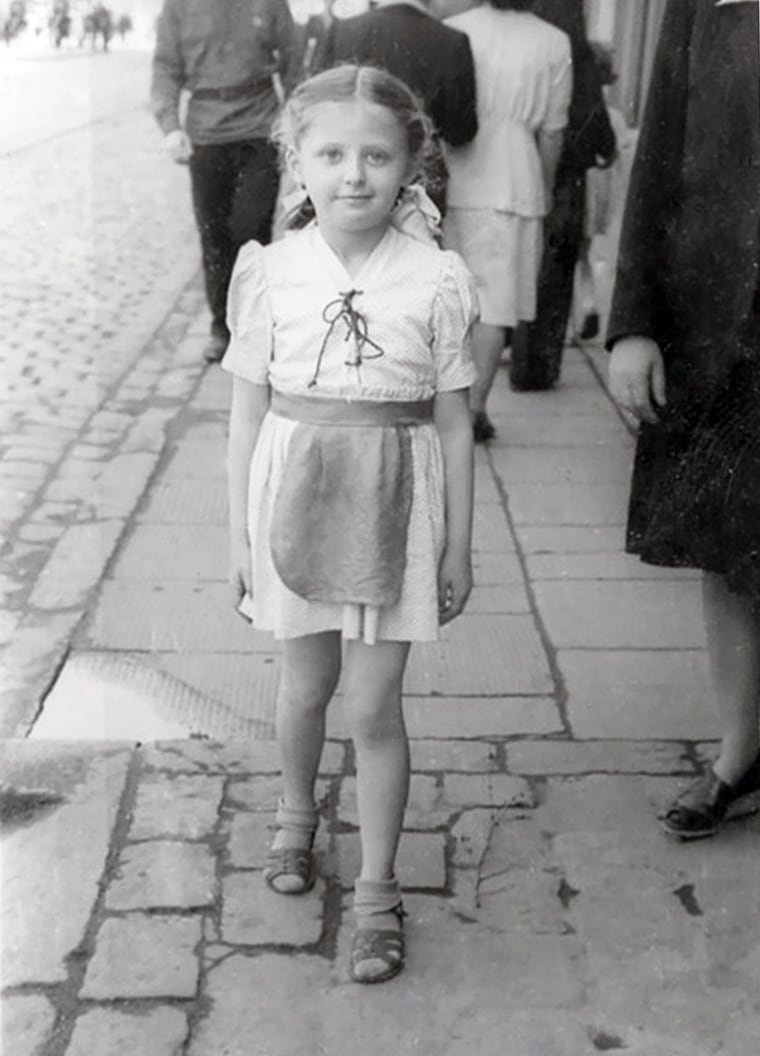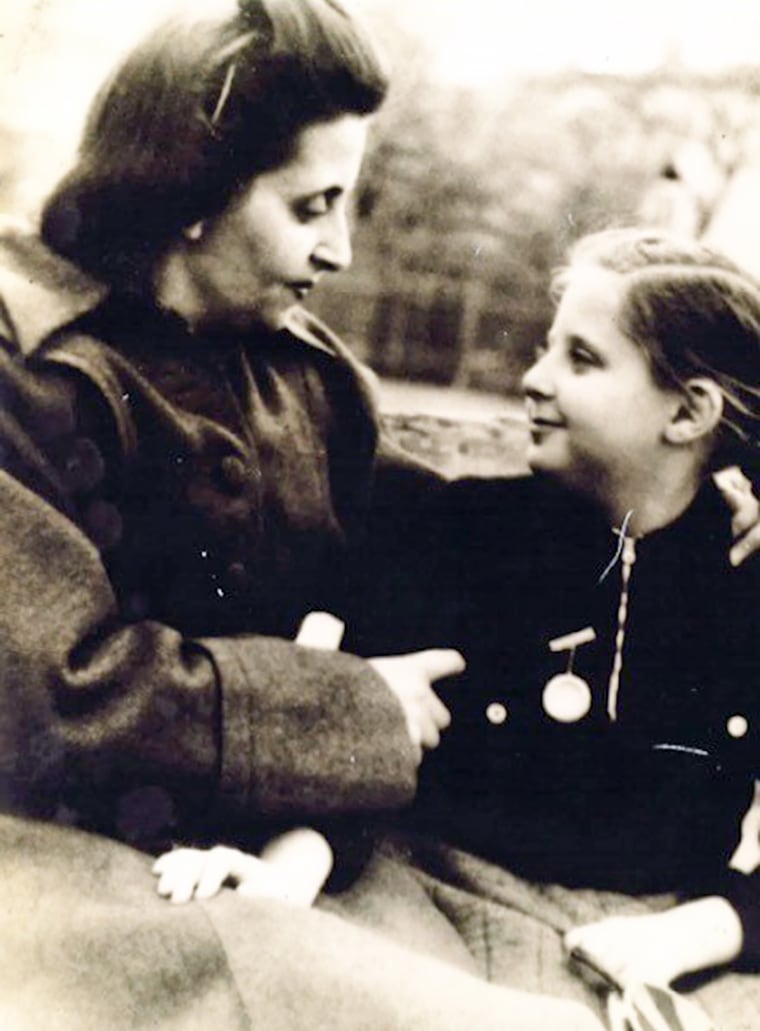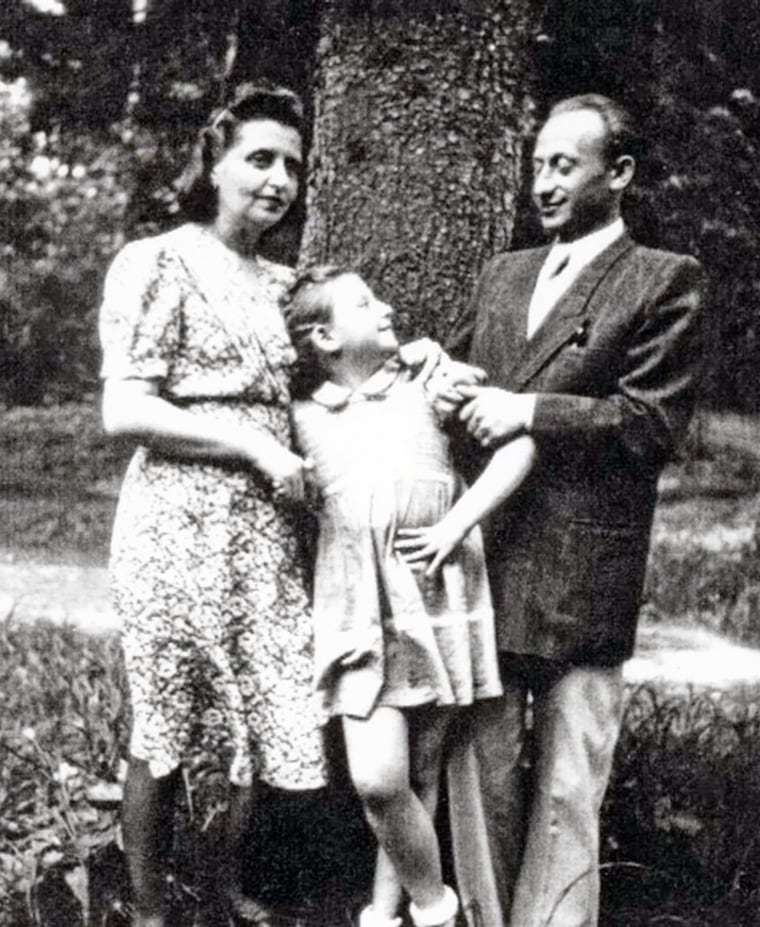When Tova Friedman came to the United States at 11 years old, she learned that children’s lives in the U.S. continued as normal during World War II and the Holocaust. It felt particularly strange to her because her childhood was dramatically different: She spent more than a year as a prisoner in a Nazi concentration camp after spending her toddler years in a Jewish ghetto.
“I was shocked when I spoke to kids my age. I was 11 years old, and they were telling me about all kind of experiences when they were children — vacations, summer camps — I couldn’t believe it,” Friedman, 84, of New Jersey, tells TODAY.com. “I thought what I experienced was what the world experienced.”
Her grandson, Aron Goodman, grew up hearing about Friedman’s childhood in the Auschwitz concentration camp and started sharing her story more widely on TikTok about a year ago. (Friedman admits she had never heard of the social media app before the pair started her account, TovaTok.) Aron says he began the project as a response to the rise in antisemitism over the past few years.
"There was no Holocaust as part of the history discussion."
Aron Goodman said of his scool's curriculum
“I noticed a lot of antisemitism on social media as well as (the fact that) my curriculum in my school for the Holocaust wasn’t adequate. There was no Holocaust as part of the history discussion,” the 17-year-old from New Jersey tells TODAY.com. “I started on YouTube with a short film following my grandmother in Auschwitz and then I started posting that on TikTok, and when people started asking questions, I thought that people might actually be interested.”

A year after Friedman was born, World War II began. When she was 5, Nazis took her to the infamous prison camp in Poland and tattooed the number 27-6-33 on her arm. Of the 5,000 children from her hometown of Tomaszow Mazowiecki in Poland, she was one of only five that survived.
“I’m the youngest of the five. Children were killed immediately,” she says. “They were the targets of the Germans, of Hitler, because they were useless.”
She says that the Nazis also feared children because survivors could share their horrific experiences with the world.
“Children may grow up with a memory and be witnesses. They were immediately killed,” she says. “I was surprised I wasn’t (killed) and most of the time there’s no explanation.”
In Auschwitz, Friedman stayed with her mother for some time before being sent to a separate part of the camp after falling ill.
“Very few children survived Auschwitz,” she says. “It’s very important to listen to a child and the point of view of a child throughout this whole terrible ordeal.”

A few weeks before the Russian army liberated the camp in 1945, her mother found her, and they were together during liberation. Friedman recalls that she hoped the Russian troops’ arrival meant she’d have food.
“All I wanted was to eat. It’s very hard to explain to people who don’t understand hunger, the different types of hunger,” Friedman says. “Somebody asked, ‘How did God feel to you in the camp?’ And they said, ‘Like a piece of bread.’ That’s all you wanted.”
TikTok followers ask Friedman loads of questions and they seem particularly interested in learning more about the tattoo.
“A lot of people ask her to see her number because that’s one of the interesting aspects that still remains,” Aron says. “Nobody really has the ability to see the numbers unless you’re … with a survivor.”
When Friedman first came to the United States, a doctor offered to remove it for her. But she said no.
“I am glad I kept mine because it’s a witness,” she says. “I feel as if my number is there to say, ‘You think this never happened? Look.’”
“I feel as if my number (tattoo) is there to say, ‘You think this never happened? Look.’”
Sometimes sharing her story feels overwhelming and Friedman says she naps when she feels too drained. But she feels it’s important to keep sharing her experience of Nazis and the Holocaust.
“Those innocent children who were murdered because they were Jewish and some of the ways they were murdered, it’s so hard for me. That’s when I get very upset when I think about how they were murdered,” she says. “Yes, it is overwhelming, but it is extraordinarily necessary.”

Aron says that most people are genuinely interested and want to learn more, but he shields Friedman from as many negative comments as he can.
“Wherever there’s Jewish presence there is always hate and antisemitism,” Aron says. “For the most part, we have had a lot of people saying, like, ‘Thank you for showing me this.’ ‘Thank you for teaching me about this.’”
Even though he knows his grandmother’s story well, he’s gradually understanding even more about her through this project.
“It’s just what she can remember off the top of her head,” he says. “I’m always learning new things about her story. I always love to hear her speak.”
Since starting TovaTok a year ago, the duo has spent more time together. They recently visited Los Angeles together where Friedman spoke about her life, her book and her involvement in a recipe book, “Honey Cake and Latkes: Recipes from the Old World by the Auschwitz-Birkenau Survivors.” Proceeds from the book support the Auschwitz-Birkenau Memorial Foundation. Friedman submitted two recipes, a pasta dish with kasha (buckwheat) and tzimmes (a stew made with root vegetables).
“Those are the recipes that our parents used to make before the war— not for me because I didn’t have a life before the war — but after the war. It’s our families’ recipes,” she says. “Those recipes tell little stories.”
Friedman hopes to share her story as long as she can. And while Aron plans to attend Washington University in St. Louis next year, far from his grandmother's home in New Jersey, he hopes he can also continue the work.
“It’s not only about me. It’s about the Holocaust and the terrible things that prejudice and hatred of the other can cause,” Friedman says. “The Holocaust is a war (about) what can happen unless humanity sort of looks at each other, people look into their own souls and think about the hatred that they feel. … It’s a warning.”
Related video: